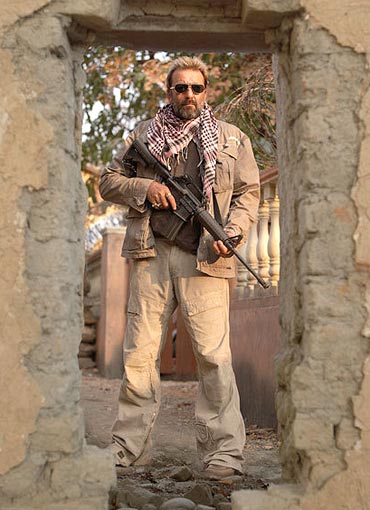
Meeting Sanjay Dutt is not an easy task, my film journalist friends warned me. "He will never turn up for the interview," one said. Another added, he will answer only in yes or no.
With such negative feedback, my colleague Hitesh Harisinghani and I went to interview him. We waited for five hours and were told he would not turn up that day. The interview could be done the next day.
The interview was important because he is the only big star of the film Lamhaa that is releasing on July 16.
The second day, Dutt turned up, but had already given 10 interviews and was too tired to answer any more questions. Can we meet tomorrow; I will be in the right frame of mind then, he told us. After waiting for four hours that day, we had no other option but to say, yes.
On the third day, Dutt arrived only 30 minutes late, but made the two-day wait worth the effort. Excerpts:
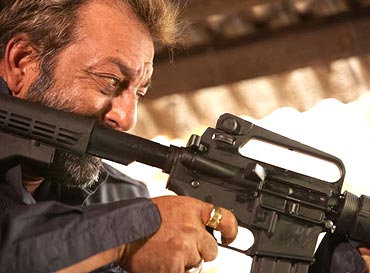
Is it true that you have very fond memories of Kashmir as a child?
Yes. I shot my first movie Rocky there. Before that, my father (late Sunil Dutt) used to take us for shooting in Kashmir. My dad used to slot shoots in the summer, so that the kids could be together in Kashmir. So, I have a lot of memories.
After Mission Kashmir, you returned with another film on Kashmir. What makes Kashmir so special to you?
It's a beautiful place. It is heaven on earth. It is the script that came to me that required Kashmir. Whether it is Mission Kashmir or Lamhaa, I go there because of the script.
In the Lamhaa promo there is a dialogue 'Kashmir is the most dangerous place and the most beautiful place in the world...'
That is the turmoil and uncertainty and all the things you see on the television. You all know how volatile that place has become. That is what it says.
What role are you playing in the film?
I am playing a military intelligence officer. The higher authorities feel I am the best person to solve the problem and I am sent to Kashmir.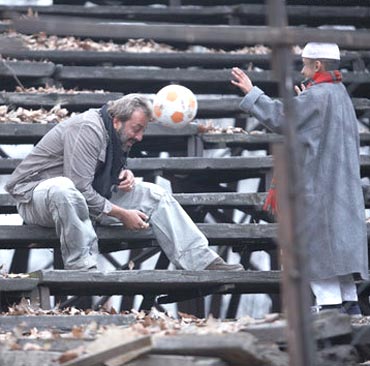
How was it interacting with Kashmiris?
It was great. We were there for 40 days. While interacting with the people I felt as if things came back to normal. People came on the streets. Many youngsters came to see the shooting. It was a common sight in the 1960s, 1970s and even 1980s, but not anymore. I feel people over there want peace and harmony.
Did you make any friends in Kashmir while shooting for Rocky? Did you get a chance to meet them this time?
Ya, Ya. During Rocky, my driver was Amin. It was so wonderful to see him again. He has become so old. He was crying when he saw me. So, yes, lots of memories.
Didn't you fear for your life while shooting in Kashmir?
I didn't feel scared. I know most people have this impression that it is scary. There is nothing to be scared about. You have a lot of security and the people of Kashmir support you, so what is there to be scared of? I want to thank Jammu and Kashmir Chief Minister Omar Abdullah and his father, Farooqsaab, who also supported us.
When your producer friend Bunty Walia came to you with this script, what was your reaction?
I loved the script and I felt proud of it. I asked him only one thing: Are you sure you want to make a film on this? He said, yes. Director Rahul Dholakia did a lot of research; he stayed in Kashmir for six months before he began shooting.
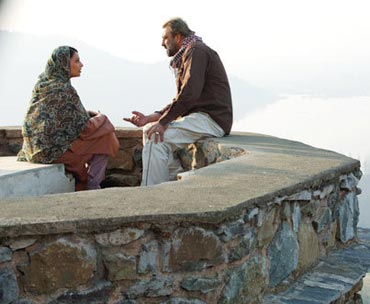
Is there a message in Lamhaa?
It is the message of peace.
Many top actors like Shah Rukh Khan, Aamir Khan have become selective and are doing one or two films a year, but you do an average of four films a year. What keeps you going?
Films are my passion. I love good scripts and I do them.
Your film career has had lots of ups and downs. You give four flops then one big mega hit. Do you analyze why there are more failures?
It depends on the audience. I believe in a film and do it sincerely. If it does well, it is well and good; if it does not, then it does not bother me. I believe in scripts and I cannot say I didn't believe in the scripts when the film flops.
Don't you feel you have done too many films for the sake of doing it?
Yes, there are many films where things have gone horribly wrong.
Do you ever feel that your kind heartedness has affected your career, because you did films for friends and they didn't do well?
I feel that way, but if a friend asks, I do it. It does not matter.
Who taught you that friends are the most important thing in life?
You cannot have 50 friends. You can have only a few friends on whom you can depend and those few friends are like millions (of rupees); you cannot buy that.
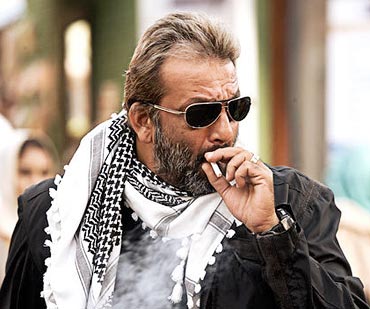
What makes Sanjay Dutt have such a large heart?
I must have been born with a large heart, yaar. Your upbringing matters.
What makes Sanjay Dutt never give up?
I studied in Lawrence School, Sanawar. Our motto was never give in. I feel that there should not be a moment in life where you give up. You can't give up. You have to keep moving, keep fighting and going ahead. It is like a war.
When a battalion moves, it moves ahead all the time. They don't sit back and say, arre yaar, ho gaya. You have to go on. The day you say bas ho gaya, mere saath kyon ho raha hai then there is no point. If you take that as a lesson and move on, you are the winner.
Tell us about your bad phases?
You've got to face them. How long can you keep running away from a problem? If there is a problem and you keep running away for six months or a year, the problem is not solved. You face the problem, understand what the consequences are. Don't run away.
What gives you strength?
Mata Rani. I believe in her. My friends, my fans, they love me and so did my father, mother and family. Many things are there.
Is this belief in Mata Rani a new phenomenon?
No. I have always been a God-fearing person. I am secular. I go to dargahs, mandirs and churches. God is one; I believe he lives within.